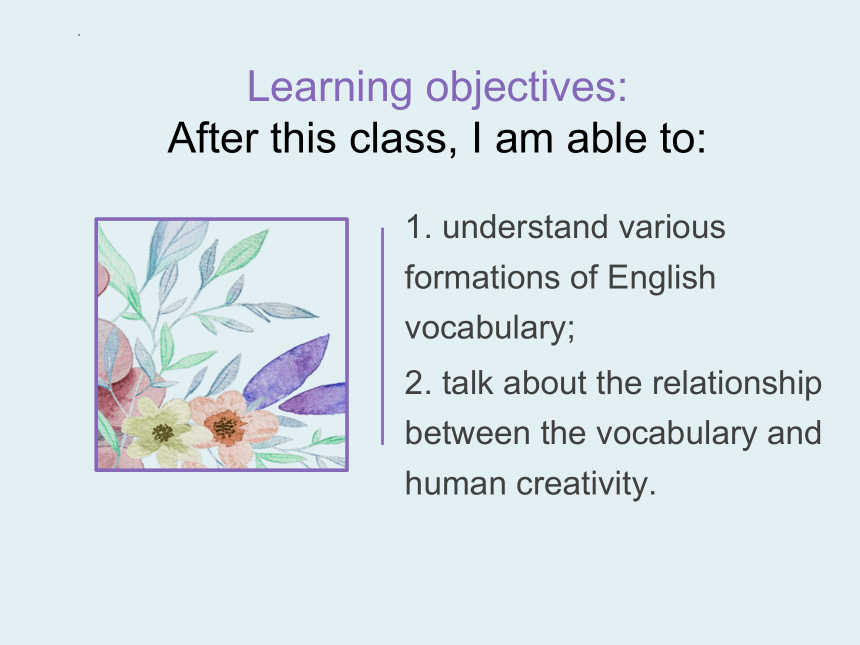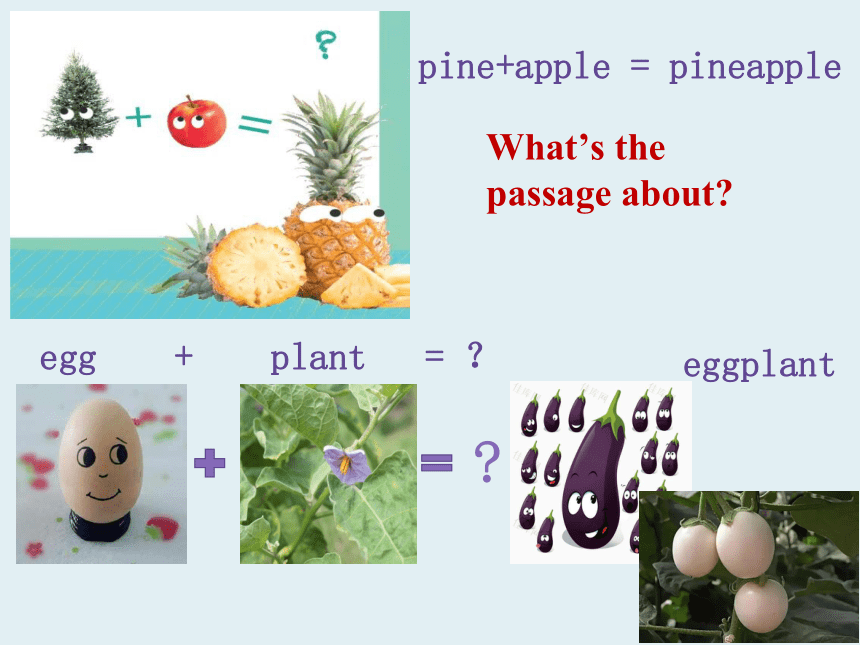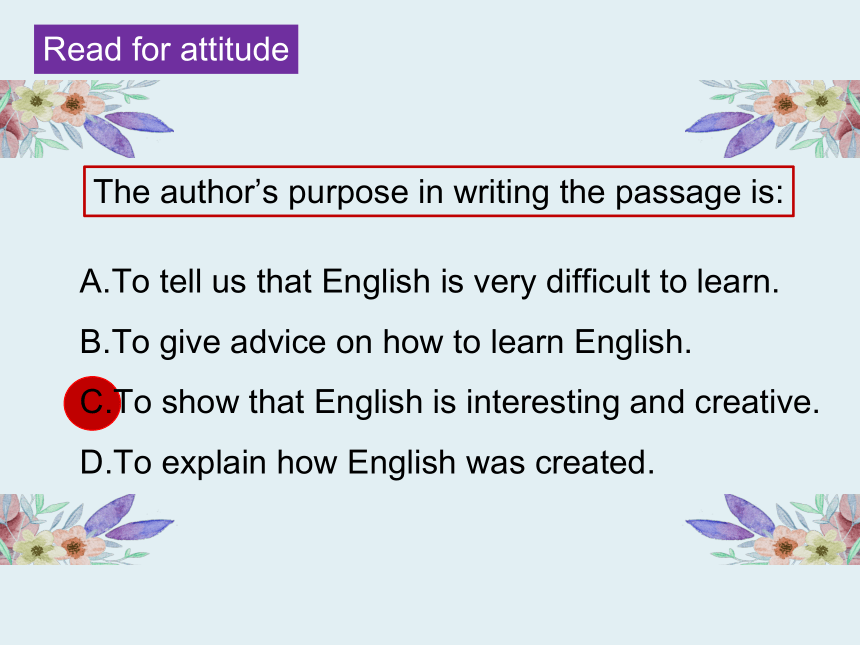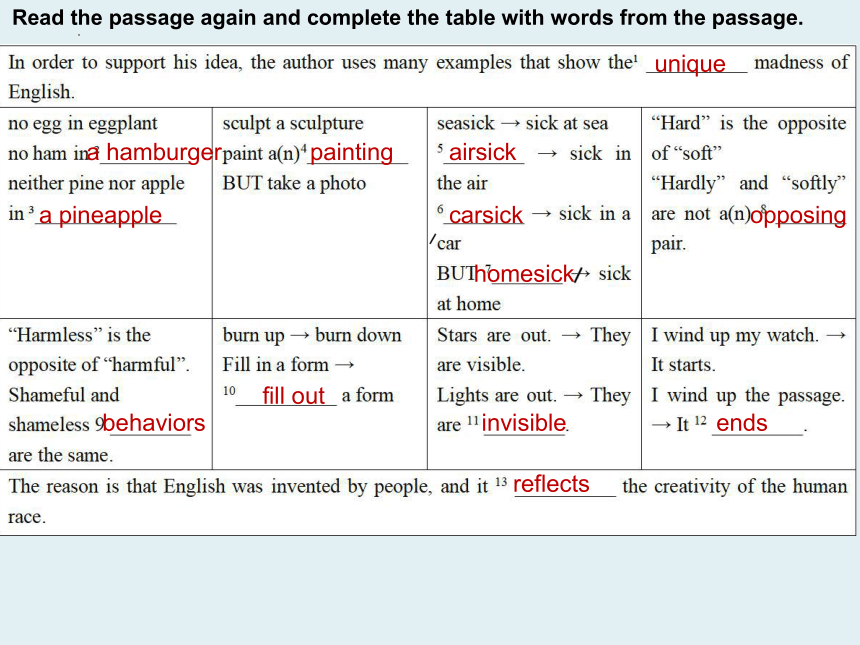外研版(2019) 必修 第一册 Unit 2 Exploring English Understanding ideas同步教学课件(11张PPT)
文档属性
| 名称 | 外研版(2019) 必修 第一册 Unit 2 Exploring English Understanding ideas同步教学课件(11张PPT) |  | |
| 格式 | pptx | ||
| 文件大小 | 5.4MB | ||
| 资源类型 | 教案 | ||
| 版本资源 | 外研版(2019) | ||
| 科目 | 英语 | ||
| 更新时间 | 2023-07-15 16:51:38 | ||
图片预览





文档简介
(共11张PPT)
Book1 Unit 2
Vocabulary for Reading
1. understand various formations of English vocabulary;
2. talk about the relationship between the vocabulary and human creativity.
Learning objectives:
After this class, I am able to:
egg + plant = ?
pine+apple = pineapple
eggplant
What’s the passage about
A.To tell us that English is very difficult to learn.
B.To give advice on how to learn English.
C.To show that English is interesting and creative.
D.To explain how English was created.
Read for attitude
The author’s purpose in writing the passage is:
unique
painting
homesick
a pineapple
a hamburger
reflects
carsick
behaviors
opposing
airsick
fill out
ends
invisible
Read the passage again and complete the table with words from the passage.
Complete the table below according to your understanding.
friend
fire
rainbow
ship
foolproof
dragonfly
1. Two separate words combining together can form a new word having _________ to do with the original ones.
2. The same root word combining with different words can form new words with very _____________ meanings.
nothing
different
Conclusions:
Self-reflection:
From this class, I learned that if I want to enlarge my English vocabulary I can ________________________________.
Read the following information and answer the questions:
What contributes to the various formation of English vocabulary
1 The word “pineapple” developed from the Spanish word
“pina”, which means pine cone. When it came to England,
“apple” was added to show it is a kind of fruit.
2 The origin of “hamburger” was a hard beef steak called
“Hamburg steak”, eaten without bread. Later, people
reinvented it and called it “hamburger”.
3 Eggplants used to be smaller and yellow or white. They looked
a bit like eggs, which led to the name “eggplant”.
Can you think of any Chinese formed in the similar way
Give some examples.
Further exploration:
Think of two or more Chinese formed in interesting and creatives ways. Get the information of how they get their names. Then share the stories briefly in your own words.
Assignment:
Book1 Unit 2
Vocabulary for Reading
1. understand various formations of English vocabulary;
2. talk about the relationship between the vocabulary and human creativity.
Learning objectives:
After this class, I am able to:
egg + plant = ?
pine+apple = pineapple
eggplant
What’s the passage about
A.To tell us that English is very difficult to learn.
B.To give advice on how to learn English.
C.To show that English is interesting and creative.
D.To explain how English was created.
Read for attitude
The author’s purpose in writing the passage is:
unique
painting
homesick
a pineapple
a hamburger
reflects
carsick
behaviors
opposing
airsick
fill out
ends
invisible
Read the passage again and complete the table with words from the passage.
Complete the table below according to your understanding.
friend
fire
rainbow
ship
foolproof
dragonfly
1. Two separate words combining together can form a new word having _________ to do with the original ones.
2. The same root word combining with different words can form new words with very _____________ meanings.
nothing
different
Conclusions:
Self-reflection:
From this class, I learned that if I want to enlarge my English vocabulary I can ________________________________.
Read the following information and answer the questions:
What contributes to the various formation of English vocabulary
1 The word “pineapple” developed from the Spanish word
“pina”, which means pine cone. When it came to England,
“apple” was added to show it is a kind of fruit.
2 The origin of “hamburger” was a hard beef steak called
“Hamburg steak”, eaten without bread. Later, people
reinvented it and called it “hamburger”.
3 Eggplants used to be smaller and yellow or white. They looked
a bit like eggs, which led to the name “eggplant”.
Can you think of any Chinese formed in the similar way
Give some examples.
Further exploration:
Think of two or more Chinese formed in interesting and creatives ways. Get the information of how they get their names. Then share the stories briefly in your own words.
Assignment:
